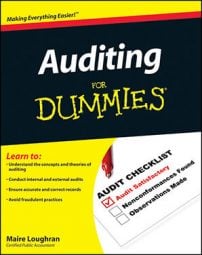After you pass the CPA exam, you’ll probably be itching to get into the job market to start making some money! Chances are good that with a CPA license in hand, you can choose to do external auditing.
If you choose to become an independent auditor you have no special relationship with or financial interest in the client that would cause you to disregard evidence and facts when evaluating your client. Obviously, being independent means you can’t both work for the client and be its external auditor. External auditors also conduct compliance, operational, and forensic audits.
Opening your own one-person business probably isn’t the way to go if you plan to be an external auditor conducting financial statement audits. If you want to do financial statement audits, you may consider getting your CPA license and immediately opening your own one-person shop. However, doing so may not be the smartest choice. To do financial statement audits, you need two things that you can’t get working in a one-person firm:
The solid, practical experience you need to put out a quality product: Textbook knowledge only takes you so far; learning by working for experienced CPAs is the logical complement to your classroom studies.
A support staff that can sufficiently tackle the work involved: CPA firms have layers of employees, from the junior auditor to the partner, to review the work product before it goes to the client. Furthermore, maintaining a high-quality system for financial statement audits that meets the American Institute of Certified Public Accountants’ (AICPA) quality peer review process is almost impossible. Why? Catching mistakes in your own work is quite difficult. Additionally, each audit has such a significant volume of work that a sole member firm would have serious problems getting a quality audit completed in a timely fashion.
Many boutique firms are one-person shops, and they can be very successful. However, if you’re a newer auditor, it is a good idea to work for a CPA firm to gain valuable experience. Indeed, you may have no choice because many states have an experience requirement that must be met prior to receiving your CPA license .
As an auditor with your new CPA license in hand, you have a few options for finding a job, including the following:
Large firms: CPA firms can be huge. The big four CPA firms — KPMG, Ernst & Young, Pricewaterhouse Coopers, and Deloitte — conduct the majority of all global audits of public companies (those that sell their stock on exchanges such as the NASDAQ).
Small firms: Many audit firms consist of a sole practitioner with a professional staff of three or four members. These types of CPA firms audit financial statements of private companies — those whose stock is closely held by a small group of investors.
Private and publicly traded companies: You can also find jobs working for private and publicly traded companies, usually in the capacity of an internal auditor (CPA license not mandatory).
The government: You can get an auditing job working for local, state, and federal government — CPA license not mandatory as well.
Although most CPAs look to do external auditing, other career options are available to auditors, including those who don’t have a CPA license. Here are some of these other options:
Internal auditing: Internal auditors work for the company they audit and don’t have to be CPAs. Their job is to make sure the company runs efficiently and effectively; they perform financial, internal control, and compliance audits for the employer.
Government auditing: Think your government is spending too much of your tax dollars on frivolous expenses? Then consider a career as a governmental auditor working for your local, state, or federal government.
Forensic auditing: Forensic auditors often discover information that’s used as litigation support. A CPA license lends more validity when a forensic auditor testifies at trial, but it’s not mandatory. A forensic auditor looks at records and documents just like any other auditor.

